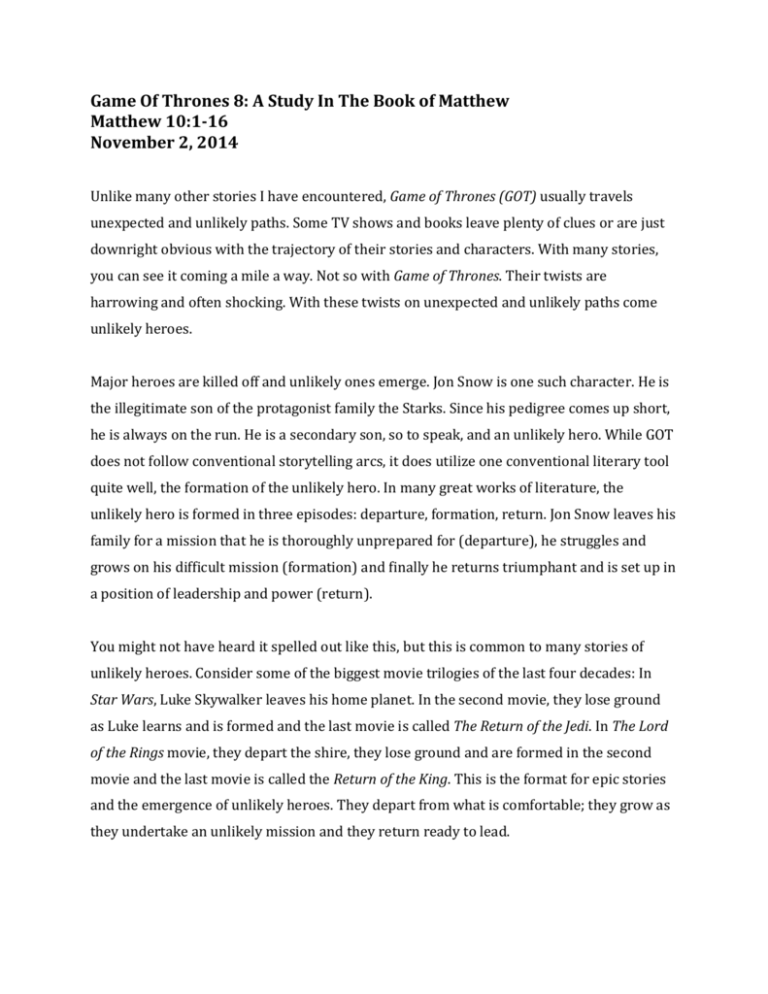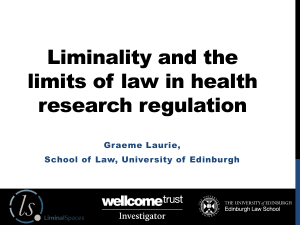Picture - Saratoga Federated Church
advertisement

Game Of Thrones 8: A Study In The Book of Matthew Matthew 10:1-16 November 2, 2014 Unlike many other stories I have encountered, Game of Thrones (GOT) usually travels unexpected and unlikely paths. Some TV shows and books leave plenty of clues or are just downright obvious with the trajectory of their stories and characters. With many stories, you can see it coming a mile a way. Not so with Game of Thrones. Their twists are harrowing and often shocking. With these twists on unexpected and unlikely paths come unlikely heroes. Major heroes are killed off and unlikely ones emerge. Jon Snow is one such character. He is the illegitimate son of the protagonist family the Starks. Since his pedigree comes up short, he is always on the run. He is a secondary son, so to speak, and an unlikely hero. While GOT does not follow conventional storytelling arcs, it does utilize one conventional literary tool quite well, the formation of the unlikely hero. In many great works of literature, the unlikely hero is formed in three episodes: departure, formation, return. Jon Snow leaves his family for a mission that he is thoroughly unprepared for (departure), he struggles and grows on his difficult mission (formation) and finally he returns triumphant and is set up in a position of leadership and power (return). You might not have heard it spelled out like this, but this is common to many stories of unlikely heroes. Consider some of the biggest movie trilogies of the last four decades: In Star Wars, Luke Skywalker leaves his home planet. In the second movie, they lose ground as Luke learns and is formed and the last movie is called The Return of the Jedi. In The Lord of the Rings movie, they depart the shire, they lose ground and are formed in the second movie and the last movie is called the Return of the King. This is the format for epic stories and the emergence of unlikely heroes. They depart from what is comfortable; they grow as they undertake an unlikely mission and they return ready to lead. This is actually an undercurrent not only in literature and entertainment but in all of humanity. So much so that Victor Turner, furthering the work of Arnold van Gennep, created the idea of liminality. The Latin root of this word, liminality is “limen”, which means threshold. Turner’s work came to several conclusions as he studied rites of passage in tribal culture, but chief among them was that liminality leads to growth and new identity. He came to learn that disorientation was essential for new identity and growth. At the heart of this idea is that an event causes disequilibrium, which leads to a state of in-between (the aforementioned threshold) and then finally emerging on the other side with a new identity and strength. Essentially - departure, formation, return. Liminality is a simple and yet profound idea. You can see it in the life of an individual. Going off to college is a perfect example of liminality. You depart for college; you are formed by years of sleep deprivation, bad ideas, water balloon launchers, living on your own and eating lots of ramen noodles. Upon completion you return to society with a new identity built upon new skills, education and relationships. You can also see liminality at work on a macro scale. Look at the recent economic downturn when our society had to depart from our old practices of leverage and overspending to a formative era of savings accounts and frugality, and a return with a new approach to financial management. Or in the case of 9/11, we departed from a seemingly safe and isolated world to a formative time of tightened security and wars, then to a return of a new stronger country. Or a great example, the Cowboys departed from the Super Bowl 20 years ago, they have had 20 years of difficult formation and now they are ready to return to the Super Bowl. Do you see how that works? Liminality is present in the big stories of our culture, it’s present in the epic stories of unlikely heroes and is present in the everyday stories of our lives. Liminality is in all stories. Just a reminder, if something is common in all great stories, it is because it is drawn from the greatest story, God’s story. If you remember the sermon two weeks ago, Matthew 4-9, there is a clear picture of Jesus’ authority being proven in all areas of this world. He has authority to teach. He has authority over sickness and disease. He has authority over nature. He has authority over sin and ultimately authority over death. In our passage today, Jesus hands that authority over to a bunch of second sons and unlikely heroes. He tells them to go and do the work he was doing. To preach like he preached and heal like he healed. The question of course is: why? Why send a bunch of untrained, uneducated fishermen, lowlifes, doubters and hotheads out with full authority to do something that they are seemingly incapable of? Matthew 10: 1-4 These men have all been previously called by Jesus. They were there for the Sermon on the Mount. They were there for the calming of the storm. They were there for healings and the pigs taking a swan dive off of the cliff. They were there…as spectators. They were disciples. Disciples in this culture were usually people who were simply learners, someone who would learn the teachings of an impressive leader; sit at their feet and take it all in. That is what they have been doing, sitting and watching. Then we read verse 2 that these 12 who were just called disciples are now called Apostles. There are a lot of words that have incorrectly become synonymous in the New Testament. We have a religious mishmash of words that we don’t often inspect. Apostle is one of them. The use of this word in verse 2 is vital. The Greek word apostello is the verb “to send.” Apostles are sent ones. They are no longer passive consumers and spectators. These Apostles are about to experience extreme liminality. These unlikely heroes are about to enter extreme disorientation. Right after the disciples are told they will drive out evil spirits and heal diseases, they are immediately called Apostles, the sent ones. They are no longer sitting at the feet of Jesus; they are being called to be the hands and feet of Jesus. If that weren’t disorienting enough, listen to the rest of the commission. Matthew 10:5-8 Jesus says to these sent ones that not only will they heal people; they will raise people from the dead…. AND they will preach. I am sure you have heard Jerry Seinfeld’s old comedy routine where he says the two greatest fears people have are public speaking and death, in that order. He goes on to say that means people believe they are better off in the casket than speaking at the funeral. Not only are these men supposed to proclaim this message, but it is preaching, something this motley crew of second sons, fishermen, traitors, doubters and hotheads are completely unready, unprepared and probably unwilling to do. They are entering the threshold of liminality. They are being asked to depart from what is comfortable - shadowing Jesus to something wholly uncomfortable - being Jesus to those in a broken world. This is a seismic shift. Depart from comfort, and embark on a mission that you feel unqualified and fearful of, and do things you have never done before. But it gets even better. Matthew 10: 9-10 While you are leaving comfort behind and doing miraculous things you have never done and have no training for, you also don’t take any of the things you normally would. Don’t take items of security. Don’t take extra money, extra clothes or anything you could use to get yourself out of a jam - don’t take it. Anything you could use that will bolster your selfsufficiency and sense of self - don’t take it. And then it gets even better. Matthew 10: 11-14 Leave comfort. Do miraculous things you have never done and have no training for. Don’t take any items that will maintain your own sense of sufficiency and security. Also you are going to knock on doors, stay in stranger’s homes and many people will reject you. You aren’t staying with relatives; you can’t check Hotwire for hotels around Galilee. Just go. Do what I have told you to do. Trust that you will find receptive people and yes, some of those people will welcome you to stay in their house, feed you and put you up for the night. This is full disorientation. They are fully immersed in a liminal state. Last year in Houston Texas, a college classroom of students began attending an Introduction to Chemistry class. From day one no one, could keep up. College is its own liminal state. You have departed from the comfort of home, you meet new people, learn new material, have little money and little time, all without the supervision of your parents. Then you have a class where no one could keep up. Students who were previously “A” students were making 40’s on all of their tests. They were drinking water out of a fire hydrant and they were drowning. At the end of the semester, the teacher had a confession to make. She accidentally taught them the General Chemistry course, another class she taught and not Introduction to Chemistry. She taught them a far higher level of content without any of the foundation. Whoops. I think the disciples could sympathize with how these students felt, “We aren’t ready for this. We aren’t trained for this. We aren’t capable of this!” Why did Jesus launch these unlikely heroes on such a treacherous path? Why would he send them on a journey they were seemingly destined to fail? Because Jesus knew that discipleship could not be passive. It couldn’t be simply a learned set of charts and precepts. It includes that, but cannot be limited to that. Jesus knew that if these men were truly going to be changed, they had to be stretched, broken and remolded. This is the heart of liminality, departure, formation and return. Jesus could have spent the rest of his days with these disciples talking about discipleship. He could have spent weeks and years telling parables about loving your neighbor and allowing them to continue watching while he did all of the important stuff. He could have been the one-man show who healed, taught and loved. He also knew something they didn’t. This wasn’t meant to be a movement of one man, nor was it to be a movement for one era. It was to be a movement that would enlist billions for every generation thereafter. If that was true, then they had to learn to do. They couldn’t remain passive disciples but had to become active Apostles, no longer those who sat, but those who were sent. All of this passage is predicated on what we read before we went out last week for Serve Sunday. Jesus knew the movement was for all future generations, and he knew he wouldn’t be sticking around, he tells the guys to pray for workers to be sent into the harvest fields. Imagine the disciples who probably didn’t know what that meant, but Jesus told them to pray and as it turns out, they were the answer to their own prayers. If your heart is moved by something - if God has given you a passion for certain brokenness or hurting or loss, you might be the answer to your own prayers, but you have to be willing to be sent. Going is essential to discipleship, and liminality is essential to going. The Christian faith was never designed to be like a college course where you collect data and assimilate knowledge. It was never meant to simply be the giving of mental ascent to spiritual precepts. It was meant to be a revolution, a transformation and a holistic movement that heals bodies and souls. It was a radical endeavor that was never meant to be a spectator sport. In fact, it was meant to be a new kingdom. A collection of people living like Jesus is King. Not simply learning like Jesus is King but living like Jesus is King. Step out into disorienting, scary and exciting new endeavors. Imagine going up to the YMCA or Courtside next week and peeking your head into a new exercise class. Inside, you see the instructor, who has gathered his class around him, as he begins to teach. He pulls out the mat and then begins to give this lecture, “Sit ups are important for your core strength. They develop new muscles that will improve your overall health. It is important to use a mat to protect your lumbar region during this practice.” Then he shows them how a sit up is done, that all makes sense. But after explaining the benefits, explaining the mat and showing them the exercise, instead of beginning the exercise - imagine the following monologue, “To really understand sit-ups, we need to understand the etymology of the phrase, ‘sit up.’ The phrase is derived from the Latin meaning to rise from a supine position, but what is interesting is that the Greek means to simply to raise your head from a supine position. This leads us to the current debate about crunches versus full sit-ups. Some people believe raising the head is enough so as not to damage the lumbar, while others believe coming to a full sitting position is essential for muscular development. Before we leave that topic, let me discuss with you the makeup of a sit-up mat - two parts polyurethane….” Now then, imagine all of the people in the room taking notes, fully okay with erudition surrounding sit-ups with no sit-ups required. That isn’t okay with me, and that can’t be with you. Foundational knowledge is essential. Teaching is essential, but we can’t get caught up discussing crunches versus sit-ups, splitting hairs over minor theological issues while the world is ripe for harvest. We can’t spend hours chasing our tails bemoaning the quality and makeup of the mat if we never plan to use it. Jesus knew this. Going is essential to discipleship and liminality is essential to going. That’s why our vision at SFC is to equip and deploy a loving community of Kingdom Entrepreneurs. We want to equip you, and we want this to be a loving community, but it has to also be about seeing broken things and fixing them in the name of Jesus. It has to be about utilizing your gifts and engaging your passions and doing something in Jesus’ name, but it will involve liminality. It will be three movements: 1) you depart from what is comfortable and known, 2) you are formed through on-the-job training as you chase the vision God has given you and 3) a joyous return when you see God show up and show off. Matthew doesn’t record it, but Luke tells the story of a larger group of equally unlikely heroes who were sent out with a similar mandate. After their fearful departure and difficult formation, they return triumphantly and joyously. They saw God at work. They didn’t just talk about how he works; they were part of his work. True joy is found there. True life is found there. The sweetest spot you will ever be in during this life is when you are using your gifts as a Kingdom Entrepreneur, big or small, long term or short term, near or far. What has God placed on your heart? What broken things have you seen in this world that you know God can fix if someone will step up? On top of the joy, you will find growth. This group of second sons, hotheads, doubters, fishermen and traitors would be transformed. Yes, from teaching, but just as much from doing. It’s one thing to learn a principal in abstract, but to see it in practice will change you. Peter, the man who was always sticking his foot in his mouth, ended up being the preacher that led 3,000 to faith on the day of Pentecost. John, the disciple, who asked Jesus if they should annihilate an entire city for their insolence ended up becoming known as the love disciple. Levi, the tax collector, who wrote down all the debts people owed, was transformed into Matthew who wrote down how everyone’s debts were paid. Going changes you. Departing changes you. There are some things you cannot learn from a Bible study. There are some things you cannot learn from a sermon. Going is essential for discipleship and liminality is essential to going. Terri Goehner live interview











